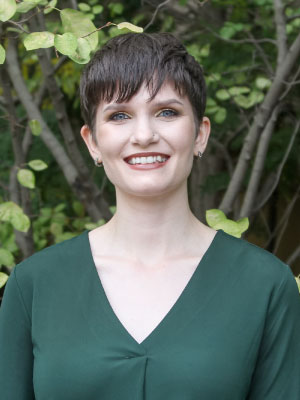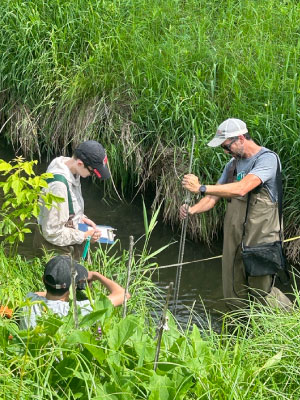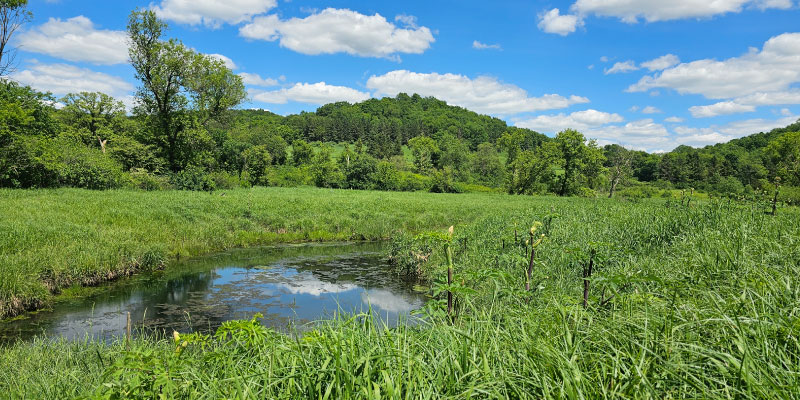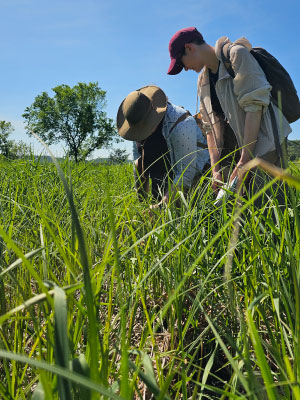
On paper, Alayne Kulp seems to capture a typical Wisconsinite.
Grew up on a dairy farm? Check. Loves a good cocktail? Check. Friendly, hardworking, and down-to-earth? Check, check, and check.
Despite her Midwest typecast, Kulp has singled herself out through her passions for geography, hydrology, and water management, which began on her family’s dairy farm in Marathon County. “I grew up working on that farm and was schooled at home,” Kulp said, “so I gained a lot of experience about how a farm worked.”
For her undergraduate degree, Kulp majored in geography with an emphasis on geographic information systems (GIS) and added a professional and technical writing minor while at the University of Wisconsin–La Crosse. After graduating in 2018, she took a few years off to work in a fine dining restaurant, however, her goal was always to go back to school and earn her master’s degree, eventually prolonged from the COVID-19 pandemic.

After learning about the Nelson Institute’s water resources management (WRM) program, Kulp decided to enroll at the University of Wisconsin–Madison, her “dream institution.” Coupled with the opportunity to learn more about some of her favorite topics, including river systems, landform processes, and watershed hydrology, Kulp was doubly excited to begin her master’s journey. “My main goal for my graduate school experience was to take more classes and gain hands-on experience in my areas of interest that my geography degree didn’t get to,” Kulp said. “After finding this WRM program and learning about its flexibility and professional focus, I knew it was exactly what I was looking for.”
“One thing I really like about this project is that our work will really matter and will have an impact on a rural wetlands area.” – Alayne Kulp
The WRM program is a 45-credit professional master’s degree that prepares students to work in the complex world of water management and conservation. The program requires students to pick an area specialty to achieve competency in a particular water-related area and complete a summer practicum project focusing on a contemporary problem in water resources.

Starting the program in August 2023, Kulp notes one of her favorite classes so far being Community and Environmental Sociology 617: Community Development with Professor Randy Stoecker. The class focuses on the social, cultural and personality factors that influence community development while referencing developing countries and rural communities. “For me, it served as an introduction to how sociologists and planners look at communities and the problems that they face. I was able to learn about the urban and regional planning side of things which has really influenced my area specialty as well,” she said.

Kulp’s area specialty focuses on watershed science and planning, which she intends to add a double degree in urban and regional planning to support. “It’s one of those things where the more classes I take, the more I want to learn and do,” Kulp laughed. She aspires to turn her specialty into a career as a science-informed watershed resource planner and hopes to work in both urban and rural areas, especially in Wisconsin.
For Kulp’s summer practicum project, her cohort was directed to collect data to document the pre-restoration conditions of a planned stream restoration project in the Fancy Creek Watershed in Richland County. “It’s an area of the state where there’s a lot of work to be done and things to learn, and it’s exciting to be able to see all the opportunities that it provides,” Kulp said. “One thing I really like about this project is that our work will support those involved in the restoration and will have an impact on a rural watershed that includes a valuable wetland ecosystem.”
Looking back at her experience so far, Kulp praises the people who have helped her in her journey, including WRM program chair Ken Genskow and graduate advisor Jim Miller, who were instrumental in helping guide and advise her. She advises future students to “be a sponge” and soak up as much knowledge as possible through professors, advisors, and other students. “Listen to those around you about what they’ve learned and be open to any information that comes your way,” Kulp concluded.